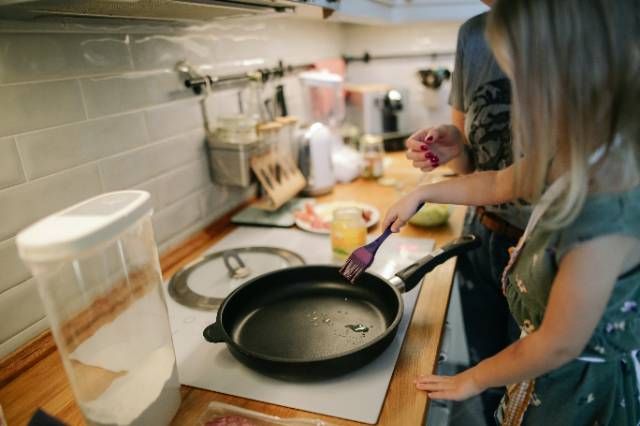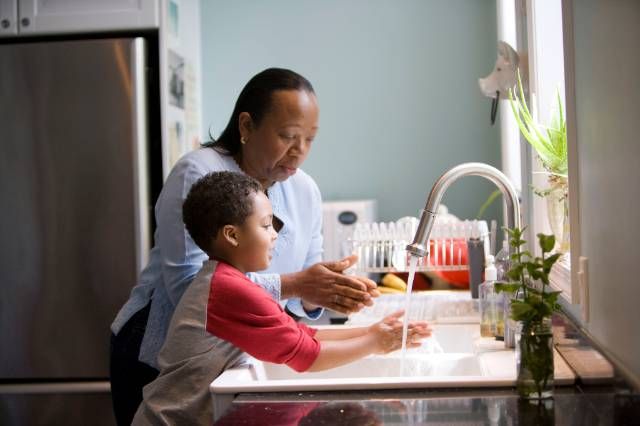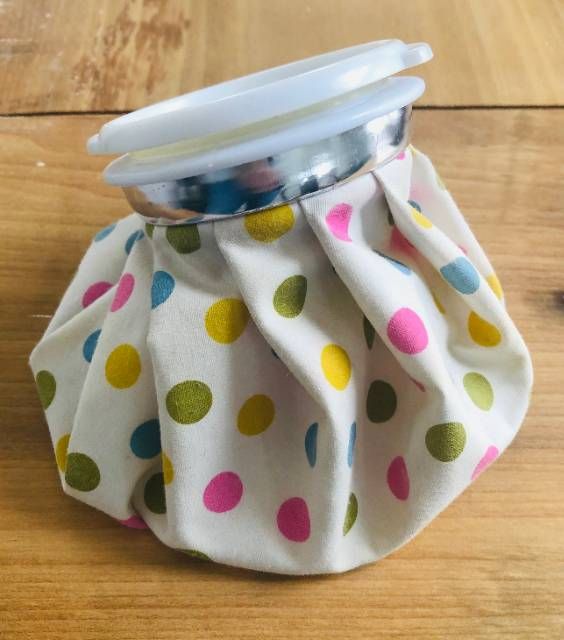
Life Skills for Kids to Learn at Every Age
Some of the most important lessons kids learn don't come from the classroom. You can teach these essential life skills for kids right at home, starting now!
Learning and practicing these activities will help them complete everyday tasks safely and easily, and navigate challenges they will meet in the real world.
See below for a list of life skills and recommendations for a general age to get started, but know that many of these can be started very early and reinforced throughout childhood.
Check and Fill a Tire
Alexandra F. said: Start with bikes and move on to the car when they are ready! Figuring out what the proper pressure should be by looking at the tire, learning how to use the pressure gauge, and knowing when you've reached the proper air pressure are all important skills for our kids to learn before they drive off on their own someday.

Be a Good Restaurant Patron
Kelly R. said: Teach your kids how to be good restaurant patrons by reading the menu, clearly and politely ordering when it's their turn, remembering good manners with the wait staff, and understanding how to tip. You can practice this at home with play food, or by pretending to be at a restaurant at your own dinner table.

Kitchen Safety
Kelly R. said: Even kids who aren't that interested in cooking will need to know their way around a kitchen someday, so teach them how to stay safe. This means getting comfortable working with kitchen tools like knives and hot stoves, but also understanding food safety considerations like hand washing and keeping surfaces clean.

Use a Map
Kelly R. said: Teach your kids how to read and navigate using a map. A good way to get started is by printing out a map of your neighborhood and using it to navigate for a fun family walk activity. You can also put them in charge of the map reading next time you visit a theme park together.
Care for the Environment
Kelly R. said: Growing up in a household that cares for the environment will make it easier for your child to carry these good habits into adulthood. You can teach your kids to care for the earth through simple acts like conserving water at home, picking up litter on family walks, avoiding unnecessary plastic, and respecting wildlife.
Make an Emergency Call
Kelly R. said: When kids know how to dial 911, they will be able to make an emergency call if an adult is unable to do so. Help them understand where you keep the phone, how to use the phone to make a call, when to dial 911, and how to recite their address and phone number for the operator. Role playing with a hypothetical phone call will help kids get comfortable.
Simple Sewing
Kelly R. said: Even if your child isn't interested in sewing as a leisure activity, knowing how to repair a seam or sew on a button will come in handy as an adult - and save money and time on clothing repairs.

Send a Letter
Kelly R. said: Even in these days of digital communication, kids should learn how to properly write a letter, address an envelope, use a stamp, and mail it out. You want them to send you holiday cards one day, right?!
Write an Email
Karina Rojas said: Along with writing a letter & thank you card, how to write an email is ever so important these days. As an educator, I have had students email the entire message in the subject line. I have also had them forget spelling, punctuation & capitalization. For example, “i wanna retake the quiz cuz I didn’t like my grade,” with no greeting or follow up about availability to make up the quiz. Email etiquette can make a huge difference when they need an extension for a project or to follow up on financial aid status in college. No offense to Grammarly, but it should not be necessary in the first place.
Change Batteries
Shila said: Next time an actual battery needs to be changed in your home, include your kids to watch and give it a try. There's a method to it, right? So many kids these days use electronic devices and are only familiar with charging stations.

Wash Hands Properly
Kelly R. said: Teach your kids why we wash our hands, when it should be done, and how to properly do it. Then get ready to keep reminding them of these things over and over again throughout the years. Check out helpful guidance from the CDC for teaching your kids about proper hand washing.
Operate a Fire Extinguisher
Kelly R. said: By the time they are old enough to stay home alone, it's a good idea for kids to know how to locate and operate a fire extinguisher in case of emergency. Take a few minutes to teach your child how to use one, and while you're at it, check the expiration dates on the extinguishers around your house.

Basic First Aid
Kelly R. said: Even before they're ready to care for their own injuries, young kids can benefit from our calm explanations of why we apply ice to a bump, gently clean a wound before bandaging, run a minor burn under cold water, or pinch our nose for a nosebleed. Help them understand basic first aid activities and look through your medicine cabinet essentials or first aid kit together, so they'll be less worried and more prepared when it comes time to treat something.
Using Outlets
Kristy Pepping said: In the technology age we live in, kids are constantly plugging in things like ipads, laptops and cell phones. And in the bathroom, older kids plugin items like hair dryers. Safely plugging and unplugging items is super important especially in areas around water like the bathroom.
Taking Turns and Sharing
Kristy Pepping said: It's important for kids to learn at an early age to share and take turns. By playing simple games with peers or friends, they can master these skills that will help when they are adults on the job or in day-to-day life activities.
Primary photo: Upparent
Upparent collects community-submitted recommendations and reviews, and any ideas that are shared reflect the opinions of individual contributors.



